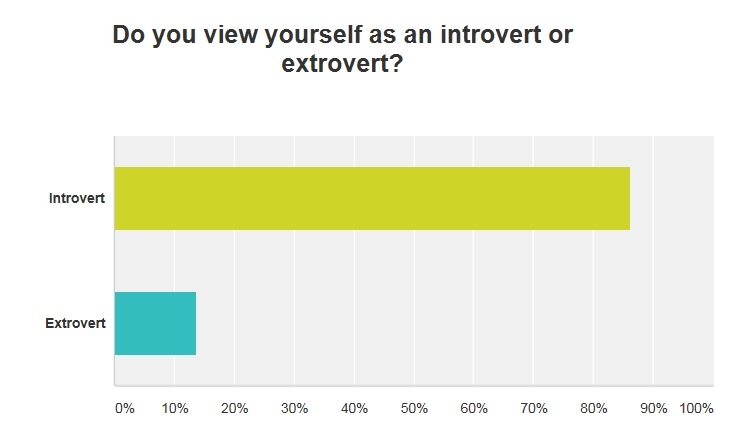I recently read Quiet: The Power of Introverts in a World That Can’t Stop Talking by Susan Cain. Although it seems like a book about introverts should have a clear definition of introverts, the topic is too complex and debated for the author to define it in simple terms. To boil it all down though, introverts prefer environments that are not over-stimulating. In addition to wanting less stimulation, introverts can also be defined by their approach to work. They tend to listen more than talk. They work more slowly and deliberately and complete one task at a time. Additionally, introverts are relatively immune to the lures of wealth and fame. Extroverts, on the other hand, like the thrill of the chase for money and status. They are multi-taskers and risk-takers. They tackle assignments quickly and make fast (and sometimes rash) decisions. They tend to talk more than they listen. (Think Tony Kornheiser.*)
Workplaces are obviously comprised of both types of people, and Susan Cain argues that extroversion has become the ideal which all people are measured against. Typical extrovert traits such as being a good speaker, socializer, and team player are appealing to our American society, but they can also be an oppressive standard for those who don’t naturally have or want those characteristics, many of whom are introverts. Additionally, many standard work environments and processes tend to fall in line with the extrovert ideal, even though methods more in line with introversion would result in more innovation and efficiency.
If extroversion is the ideal, then you could argue that all leaders should be extroverts. Quiet tells a different story though. Studies have shown that different types of workforces excel under different types of leaders. If the workforce is passive, then extroverted leaders are called for. An extroverted manager will be able to get the passive workforce to produce more than an introverted manager due to the extrovert’s ability to verbally motivate and inspire people. If the workforce is more active and trying to improve the process or product, an introverted manager is better suited to lead them. The introverted leader will listen to the workers’ ideas and will spend time contemplating whether to implement them or not. The workers will see their ideas being given serious consideration which will encourage them to identify other efficiencies and possible innovations. They will likely continue to share these ideas with leadership, resulting in a cycle of improvement. With an extrovert in the lead, the active workers will get discouraged when their ideas are not being fully listened to or when the manager makes a snap decision or conclusion without thinking everything through. Due to the discouragement, the workforce will become unsatisfied. The most active contributors will either seek greener pastures or become passive themselves. Leaders and managers must be aware of their teams’ composition and try to act introverted or extroverted, as needed.
Tied into the extrovert ideal is the notion that teamwork is desirable and should be elevated above everything else. Introverts may buy into this (because who wants to be considered “not a team player?”), but due to their nature, they prefer to work independently. Studies have shown that solitude and freedom from interruptions allow for more efficiency and innovation than group work. The best of the best from concert violinists to chess players to college students are those who spend the most time studying or working on their own. In one study, the Coding War Games, top programmers were not found to be those with the most experience or resources. It was the programmers who had the most privacy, personal space, control over their physical environments, and freedom from interruption that performed the best. Unfortunately, many companies have open-floor plans, and various studies have shown that these set-ups actually reduce productivity and even impair memory. The open floor plans are meant to encourage collaboration and interaction, but they result in higher staff turnover, elevated stress levels, and more workers out with the flu. Even if an office has several nooks and private rooms for employees to squirrel away in when they do not want to be interrupted, most companies still expect the workforce to work on teams and complete exercises such as brainstorming. Group brainstorming in person does not work though due to production blocking. In that group setting, only one person can be talking or producing an idea at a time. Brainstorming is better done with all the individuals working on their own and submitting their ideas online by a certain deadline. In this situation, people can work from where they feel most comfortable, and all participants can be thinking of possible solutions or ideas at the same time. This goes against the extrovert ideal, but it should produce better results. In the words of Steve Wozniak, “I don’t believe anything really revolutionary has been invented by committee…. You’re going to be best able to design revolutionary products and features if you’re working on your own. Not on a committee. Not on a team.”
I picked up this book after hearing a bit about it in the December 2015 Future Fellows article, “Beyond the Math: Recommended Reading for Actuaries.” Since reading it, I’ve found myself trying to assess whether new people I meet are introverts or extroverts. I am also paying more attention to my team’s composition as well as my office surroundings. I am trying to keep my phone turned off, to not break my concentration. My co-workers continue to ask me questions throughout the day, but maybe I should try to limit them to five good minutes….*
*Tony Kornheiser is a writer and the talk show host of the ESPN television show, “Pardon the Interruption.” Five Good Minutes is a regular segment of “Pardon the Interruption.”
Please click here to take the survey to indicate whether you are an introvert or extrovert. We will close the survey on October 30 and share the results.
Survey result as of 11/8:

